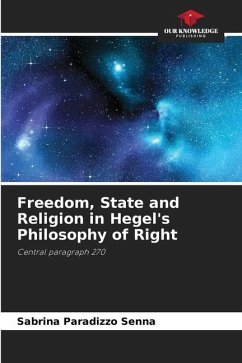
Individual Freedom in Hegel's Philosophy of History
Its Dialectical Process
Versandkostenfrei!
Versandfertig in 6-10 Tagen
24,99 €
inkl. MwSt.

PAYBACK Punkte
12 °P sammeln!
In the philosophical tradition, the question of freedom has been one of the most erected and most discussed themes; this is undeniable. Until we reached the Hegelian theory of freedom, the conception of freedom was, from its classical archetype, linked to a political morality - as we see in the ancient Greek world - to an understanding of freedom based on a subjective element, as proposed by the moderns. At the apex of German idealism, Hegel (1770 - 1831) proposed one of the most striking theories of freedom, and even one of the most original, since its purpose is to roughly unite the two conc...
In the philosophical tradition, the question of freedom has been one of the most erected and most discussed themes; this is undeniable. Until we reached the Hegelian theory of freedom, the conception of freedom was, from its classical archetype, linked to a political morality - as we see in the ancient Greek world - to an understanding of freedom based on a subjective element, as proposed by the moderns. At the apex of German idealism, Hegel (1770 - 1831) proposed one of the most striking theories of freedom, and even one of the most original, since its purpose is to roughly unite the two conceptions indicated above. A type of freedom that apprehends not only a subjective freedom - as proposed by his predecessors in modernity - but also a freedom linked to political morality - as in the ancient Greeks.














